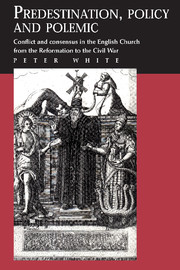 Predestination, Policy and Polemic
Predestination, Policy and Polemic Book contents
- Frontmatter
- Contents
- Preface
- Acknowledgements
- 1 The polemics of predestination: William Prynne and Peter Heylyn
- 2 The theology of predestination: Beza and Arminius
- 3 Early English Protestantism
- 4 The Elizabethan church settlement
- 5 Elizabeth's church: the limits of consensus
- 6 The Cambridge controversies of the 1590s
- 7 Richard Hooker
- 8 The early Jacobean church
- 9 The Synod of Dort
- 10 Policy and polemic, 1619–1623
- 11 A gag for the Gospel? Richard Montagu and Protestant orthodoxy
- 12 Arminianism and the court, 1625–1629
- 13 Thomas Jackson
- 14 Neile and Laud on predestination
- 15 The personal rule, 1629–1640
- Select bibliography
- Index
14 - Neile and Laud on predestination
Published online by Cambridge University Press: 11 September 2009
- Frontmatter
- Contents
- Preface
- Acknowledgements
- 1 The polemics of predestination: William Prynne and Peter Heylyn
- 2 The theology of predestination: Beza and Arminius
- 3 Early English Protestantism
- 4 The Elizabethan church settlement
- 5 Elizabeth's church: the limits of consensus
- 6 The Cambridge controversies of the 1590s
- 7 Richard Hooker
- 8 The early Jacobean church
- 9 The Synod of Dort
- 10 Policy and polemic, 1619–1623
- 11 A gag for the Gospel? Richard Montagu and Protestant orthodoxy
- 12 Arminianism and the court, 1625–1629
- 13 Thomas Jackson
- 14 Neile and Laud on predestination
- 15 The personal rule, 1629–1640
- Select bibliography
- Index
Summary
In replying to Burton, Jackson had mentioned that he expected to be charged in Parliament. There, above all, where what Arminianism meant was uncertain, the charge might gain credence. Only by a deliberate strategy of widening its connotations had Pym been able to make it a major issue. After the king's unsatisfactory first answer to the Petition of Right, for example, he claimed that ‘Arminian’ alteration in religion was linked with a plan to alter the government, and Laud and Neile were named in the Commons’ Remonstrance under the heading of innovation in religion. Laud noted in his diary: ‘one in the house stood up and said: Now we have named these persons, let us think of some causes why we did it. Sir Edward Coke answered, Have we not named my Lord of Buckingham without showing a cause, and may we not be as bold with them?’ The charge of ‘Arminianism’ carried weight only if it was exploited for its political as well as its polemical connotations.
Neile prepared a formal reply to the Commons accusations. To blacken a man's name with ‘imaginary crimes supposed not proved’ and to expose him to obloquy as an enemy of church and state could hardly stand ‘with charity, Christianity or justice,’ but at least it gave him an opportunity to clear his name. ‘I pray that credit shall be given to what I shall say for I will speak nothing but truth as I shall answer to God the best judge of truth and the best avenger of falsehood.’
In Parliament, undoubtedly, accusations of Arminianism were subsidiary to charges of popery, and Neile's reply reflected that priority.
- Type
- Chapter
- Information
- Predestination, Policy and PolemicConflict and Consensus in the English Church from the Reformation to the Civil War, pp. 272 - 286Publisher: Cambridge University PressPrint publication year: 1992
